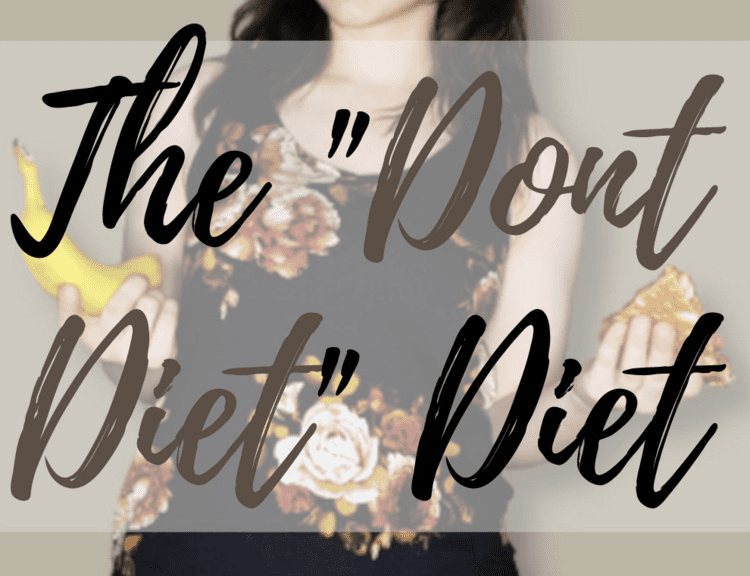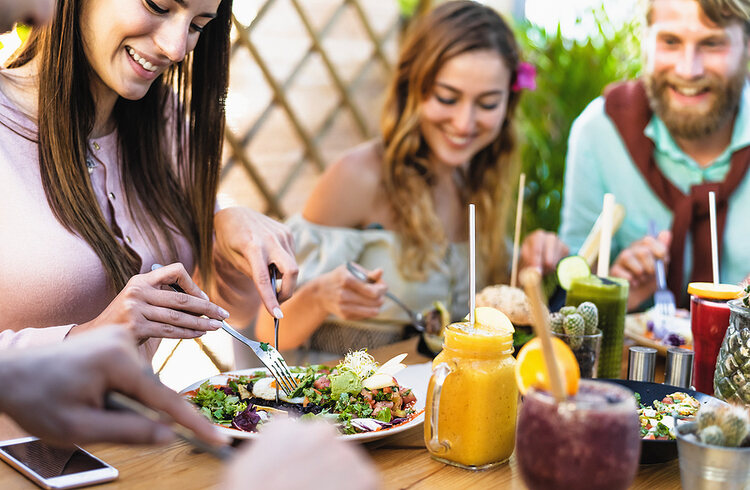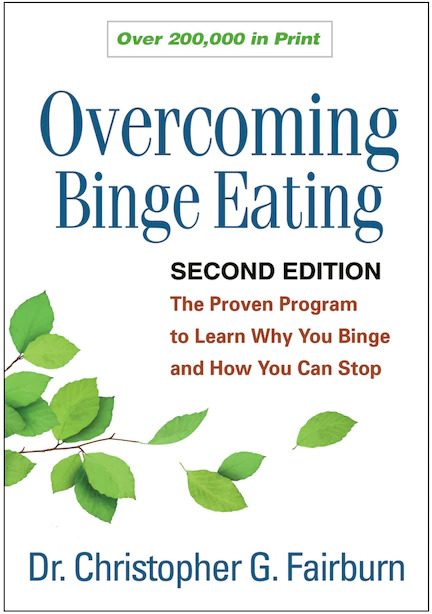When most people think of healthy eating, they imagine avoiding foods like chips, candy, and soda. Some even believe that so-called “junk food” should never pass their lips. But when asked if they’re on a diet, they firmly state it’s a “lifestyle change.”
However, with all the food restrictions in place to maintain this “healthy” eating, I wondered if it was really healthy at all. So, what exactly is a diet? When is a healthy eating plan taken too far? I’ll answer these questions in this article.
When Does a Lifestyle Change Become a Diet?
The word diet is used to refer to one’s eating habits. However, “dieting” is when you’re trying to get results without caring about nutritional needs. This includes “fad diets” or “quick fixes,” meant to have some miracle result. Trying to lose weight quickly and treat conditions in ways not recommended by a doctor fall in this category.
On the other hand, healthy eating is choosing foods for your total health and well-being. But when we take healthy eating to the point of obsession, it can become a diet in disguise. In the end, we trap ourselves in a cycle of trying to feel better by eating more restrictively or “clean.”
Diets usually cut out a specific food group or macronutrient and have a time limit to them. Cutting out these foods can deprive your body of key nutrients for complete health. Our bodies are made to bring in nutrition from many sources and thrive on getting a variety of food. Yes, your body is better off eating the carbs.
Food rules are what make a diet. If you’re avoiding certain foods or overeating foods that you don’t particularly enjoy, you’re likely dieting. Dieting can cause many issues, such as headaches, constipation, malnutrition, irritability, and fatigue. With side effects like this, it’s hard to believe dieting is healthy.
Dieting can also harm our mental health and happiness. It makes you avoid your favorite restaurants and the foods that bring you joy. I remember when I was dieting, life felt so colorless and bland. In reality, if you’re eating for your health, it shouldn’t be making you feel bad.
"Moderation. Small portions. Sample a little bit of everything. These are the secrets of happiness and good health. You need to enjoy the good things in life." – Julia Child Click To TweetFrom Healthy Eating to an Eating Disorder
The obsession with eating perfectly can translate into an eating disorder called orthorexia. Orthorexia is developed when someone is fixated on healthy eating, to the point that it takes over your life. In the end, it actually makes you less healthy, both mentally and physically.
People with orthorexia have trouble eating small amounts of junk food or food considered bad. Commonly, they cut out entire food groups and follow the rules they’ve set for themselves religiously. People with orthorexia may only eat the “purest” foods, refusing to eat anything not organic, gluten-free, grass-fed, etc. They have trouble trusting food someone else has made.
Orthorexia also comes with a sense of morality over the way you eat, seeing your way of eating as better and more deserving of respect. Unfortunately, this thinking and lifestyle can isolate you, impacting your mental wellness and ability to enjoy activities. Like many eating disorders, there’s a severe need for control. Orthorexia is often paired with over-exercising.
If you think you may be suffering from an eating disorder like orthorexia, please speak to your doctor about it. They will set you on the right path for recovery.
Eating For Your Health and Well-Being
Creating a healthy lifestyle begins with a focus on nutrition but also includes enjoying the foods you love. The key here is moderation. Letting yourself eat foods that are high-calorie or less nutritious won’t set you back from your goals unless you’re overeating them. This way, you’ll be taking care of your well-being by allowing yourself a little joy with eating.
For a general eating plan, here are the USDA’s food guidelines, but there’s no need to follow them rigidly. Also, stick to reasonable portion sizes and eat slowly. This will allow you to feel full before eating too much because your body needs time to tell itself it’s no longer hungry. Don’t feel food guilt because it never helps anyone. Moderation and self-compassion will be your reasons for success.
If you’re looking to lose weight, don’t worry about losing it quickly. It will come down slowly on its own as mine did. Work on taking care of your health while still enjoying your favorite foods once in a while. The best thing you can do is eat lots of fruits, veggies, whole grains, protein, and less processed foods.
Don’t forget to make sure you’re exercising for optimal health. Even light exercise a few times a week is enough to make a big impact.
Unless prescribed by a doctor to treat an ailment, you have no real reason to diet. I’m proof that you can lose weight while still enjoying the foods you like. I’ve kept slowly losing weight for over a year now, and I’m currently down over 40 pounds. The best part is I still enjoyed eating this entire time. For most people, this is a foolproof way to reach a healthy body weight.
Healing Your Relationship with Food
If you’re looking to give up food restrictions and have a good relationship with eating again, I have the perfect recommendation! Anti-Diet by Christy Harrison is a book that shows readers how they can take back their power from diet culture. It teaches you how to master intuitive eating so you can stop binging and dieting for good.
If you haven’t read Anti-Diet yet, I wholly recommend it. This book helped me learn to finally stop the binge/restrict cycle and move on with my life. Christy herself reads the audiobook, which puts genuine emotion into the words you’re hearing. If you’d like more information on the book, I wrote an in-depth and honest review here.
Healthy Eating or Diet: Final Thoughts
Healthy eating is not as hard as most people make it out to be. There’s no need to give up your favorite foods or label them as bad, so you feel guilty eating them. Remember, health includes happiness, and enjoying what you eat is definitely part of that.
Weight loss should never be done quickly or by dieting. Making a lifestyle change that focuses on health and well-being, rather than only weight loss, will make you successful in the end. Lasting results (and keeping your sanity) come from taking it slow and enjoying the journey!
Have you ever had your healthy eating become a diet by accident? Share your story in the comments!
That’s it for now everyone. If you’ve found some value in this post, please share it to inspire others too! Thanks!

Facebook | Twitter | Instagram | Pinterest
This post contains affiliate links for products that I love. If you use these links to buy something I may earn a commission with no additional cost to you. Thanks for helping keep this site going! Also, this post was made for the site Lose Weight With Ang. If you’re reading this on a different site, please email us https://loseweightwithang.com/contact/
References:
- https://my.clevelandclinic.org/health/articles/9476-fad-diets
- https://www.medicalnewstoday.com/articles/324093#summary
- https://dietaryguidelines.gov/
- https://www.webmd.com/mental-health/eating-disorders/what-is-orthorexia
- https://www.medicalnewstoday.com/articles/318630#summary
- Photo by Andres Ayrton from Pexels





Yes indeed 🙂
Good advice post in need!
In my mind, healthy eating is about eating relatively more of highly nutritious foods and relatively less of less nutritious foods. When it starts getting into the territory of “eat only” or “eat none of,” that gets into dieting territory.
Very well said. It took me a long time to learn that because of diet culture being everywhere.
Diet culture has so massively warped our society’s relationship with food.
Thanks CA, for the humor and the compliment!
Pingback: When Does Healthy Eating Become a Diet? | Lose ...
I enjoy eating healthily but I’ll still eat junk food as a treat.
Great to hear!
I’m trying to get a healthy mind and attitude first, hoping the healthy eating comes later.
I think you’re going about it the right way. Mental health and physical health are well connected.
Pingback: How People React When You Lose Weight - Lose Weight With Ang